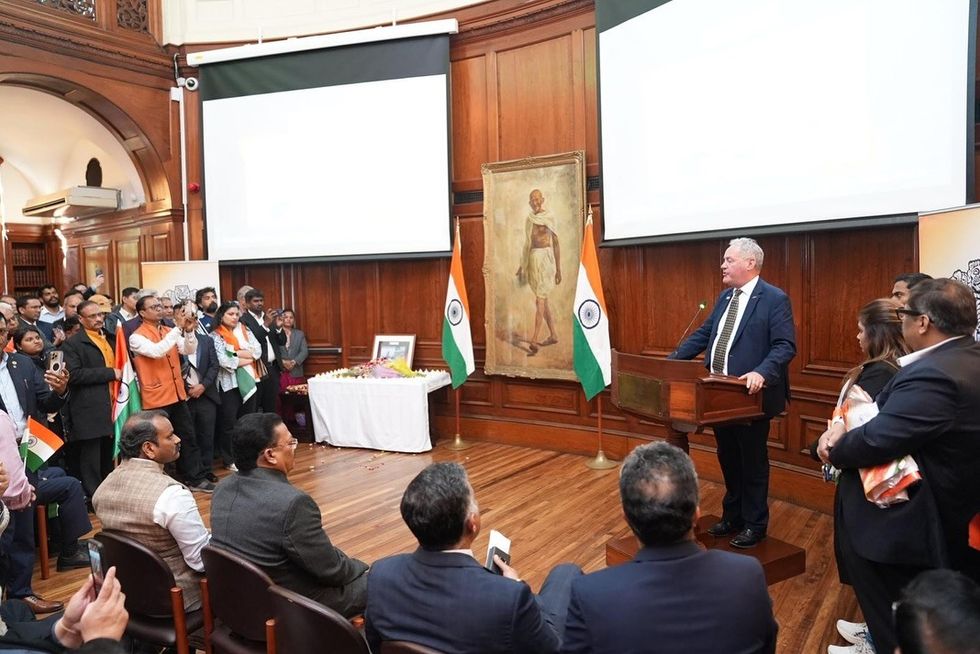With the next UK general election looming over the horizon, upwardly-mobile British Indians will be a critical voter constituency in various parts of the country.
In recent times, there has been a fraying of relations between the wider British Indian population and the Labour Party.
In the 2015 general election, the Conservatives under the leadership of former prime minister David Cameron won a million ethnic-minority voters for the first in its history – with former Labour voters in Gujarati Hindu and Punjabi Sikh communities driving this shift in electoral support. The disastrous Jeremy Corbyn experiment did little to help the relationship between the British political left and aspirational and patriotic Indian-heritage communities defined by the traditional triad of faith, family and flag.
While Labour looks destined to return to government after a lengthy period of Tory-led rule, there is no room for complacency. If Sir Keir Starmer wants a workable parliamentary majority, winning back family-oriented and entrepreneurial ethnic-minority voters1 who have recently flirted with the Tories – with some not only providing their electoral support, but also their financial backing – should be high on the agenda.
This, of course, requires a very different politics to the obsessions with race and victim-framing of minorities which has taken hold on the contemporary British left. The emergence of Black Lives Matter (BLM) on these shores – which saw Starmer ‘take a knee’ alongside his deputy Angela Rayner in solidarity with the movement – was ultimately the brainless importation of American-style racial identity politics. A clear example was British BLM demonstrators chanting “don’t shoot” at their own police officers – who are pre-dominantly unarmed and overwhelmingly support that model of policing.
America has a vastly different national context – a youthful country that is struggling to get to grips with the legacy of slavery and segregation.
A British politics of fairness and equality should not draw inspiration from America’s culture wars. Neither should it look to major EU member-states such as France, Germany, and the Netherlands, who lag some way behind post-Brexit Britain when it comes to the provision of anti-discrimination protections on the grounds of race, ethnicity, and religion. A recent study2 published by Sunder Katwala’s British Future found 80 per cent of ethnic minority Britons believed that the UK is a better place to live, as someone from an ethnic minority, than other countries like the USA, Germany, or France. More than two-thirds agreed that the UK had made significant progress on racial equality in the last 25 years.
For Labour to re-engage with British Indian voters who have distanced themselves from it in recent times, it must not only champion the advances Britain has made in terms of racial equality, but also celebrate the fantastic achievements made by the country’s patriotic and aspirational minorities.
This includes Indian-origin families which span different faiths – whether it is Hindus in Harrow, Sikhs in Coventry, Muslims in Bolton, or Roman Catholics in Swindon. Far too many on the British left view disparities and inequalities through the prism of race – meaning that the importance of family structure is all too often left by the wayside. There is no denying that family stability and intergenerational connection are influential determinants in the shaping of young people’s development. While six per cent3 of Indian-heritage children aged up to 15 years live in a lone-parent household, this increases to nearly one in five for their white-British peers and all the way up to 63 per cent for their counterparts of black-Caribbean origin. A family-centred social policy agenda for modern Britain is urgently needed and traditional-minded ethnic minorities understand this more than most.
None of this is to say that the work is done on racial and ethnic equality in Britain. With ‘culturally distant’ names faring worse than traditional English-sounding names in several CV-based field studies, the expansion of ‘name-blind’ applications is needed in the UK’s labour market. The NHS must become more responsive to the needs of an ever-diversifying population – something that was exposed during the Covid-19 pandemic. In the school system, there should be greater emphasis on the outstanding contributions made by non-white servicemen to the Allied victory in the second world war – especially those who served in the British Indian Army and Royal Indian Navy. There must be a rebuilding of police-community relations, especially in inner-city London following the Casey report’s conclusion4 that the Met has “yet to free itself of institutional racism”.
That is the sweet spot for the British political Left – to rise above both the ‘obsessives’ and ‘denialists’ in the race-relations debate. A practical anti-racist politics in the UK should take pride in the achievements we have made as a country and aspire for it to be the ultimate gold-standard example of an advanced and inclusive multi-racial democracy in the modern world.
That is how the Labour party can move beyond the politics of grievance and deliver for multi-ethnic Britain in the future.

- Dr Rakib Ehsan’s new book, Beyond Grievance: What the Left Gets Wrong about Ethnic Minorities, is now available to order from Amazon
1 www.britishfuture.org/ethnic-minority votes-up-for-grabs/
2 www.britishfuture.org/report-examinesattitudes-to-race-today-as-britain-marks75th-windrush-anniversary/
3 www.ons.gov.uk/peoplepopulationandcommunity/birthsdeathsandmarriages/ families/adhocs/12947proportionofchildr eninloneparentfamiliesbyethnicgroup englandandwales2019
4 www.met.police.uk/SysSiteAssets/media/downloads/met/about-us/baronesscasey-review/update-march-2023/baroness-casey-review-march-2023a.pdf



















 Bob Blackman MP speaks during the event
Bob Blackman MP speaks during the event